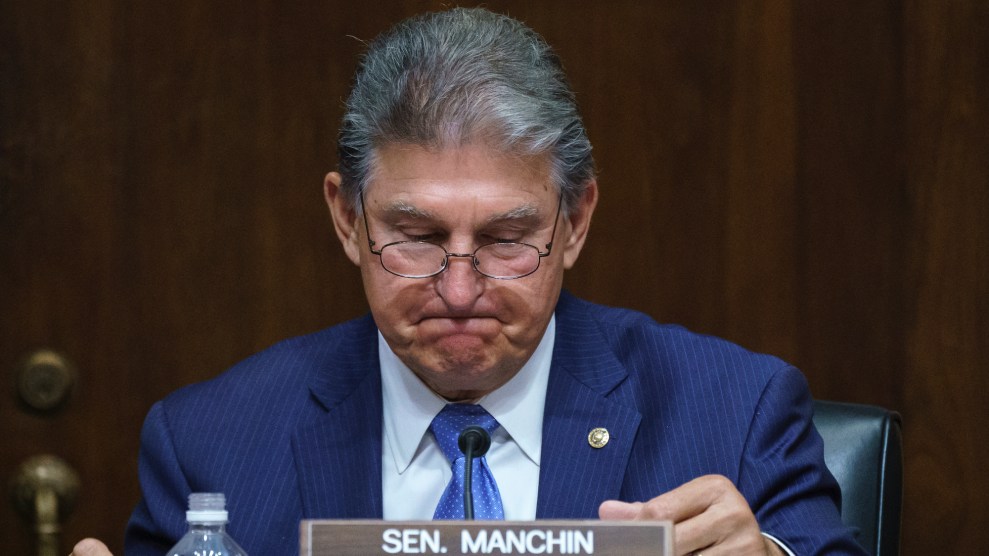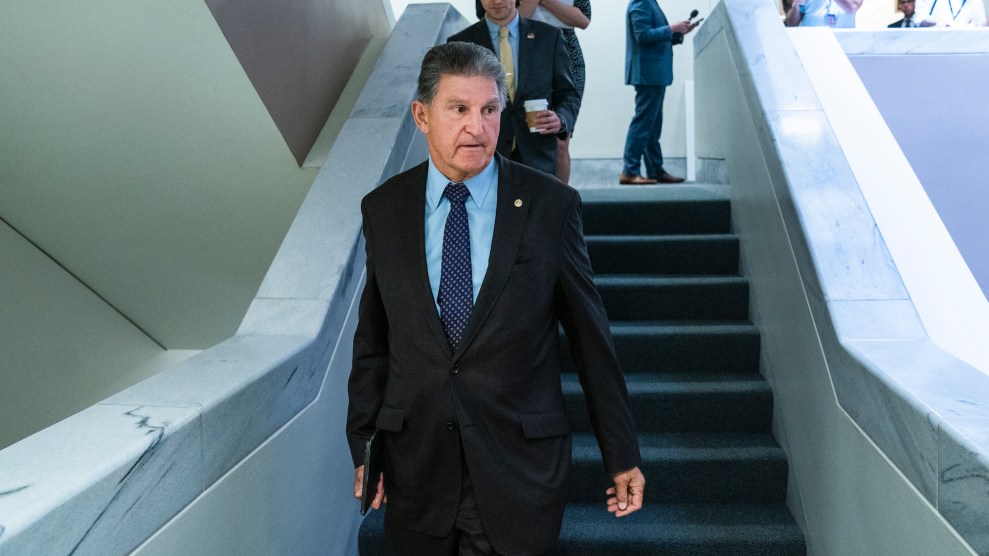
J. Scott Applewhite/AP
Rep. Mikie Sherrill represents the northern New Jersey suburbs on the outskirts of New York City, one of the wealthiest congressional districts in the country. She is a member of the Blue Dog Coalition, a business-friendly caucus that errs on the side of lower taxes and fewer government handouts. She was first elected to Congress in 2018 with a class of moderate lawmakers who had flipped GOP-held seats—and for whom Democratic leaders made special efforts to protect from the “socialist” label that progressive priorities, such as Medicare for All, might impose upon them in their first reelection campaigns.
But when the House Education and Labor Committee met last month to work on a $3.5 trillion social spending and climate bill, it was Sherrill who took the lead on advancing a progressive priority: A federally backed universal child care program. Her amendment would remove an income eligibility cap that existed on the $250 billion program, allowing every family in America to put no more than 7 percent of their income toward child care costs. “The initial proposal for addressing child care was simply not enough,” Sherrill says. “I’ve talked about it in blue areas of my district, I’ve talked about it in red areas, and I’ve yet to mention this without seeing—especially moms’—faces lighting up.”
Progressive lawmakers have long promoted universality to inoculate their efforts against being considered “welfare,” a label that dooms entitlement programs. “There’s a reason Medicare and Social Security have not been able to get taken away,” says Rep. Mondaire Jones (D-N.Y.), a progressive lawmaker who helped orchestrate the amendment. But for moderate lawmakers who represent affluent districts, there is much to be gained from a universal program that benefits their wealthy constituents. The average cost of child care in New Jersey is nearly $13,000 per year—only about $650 less than the average cost of in-state tuition at one of the state’s public colleges, and still a heavy lift for the upper-middle class. To team up with Sherrill to press for universality was a “no brainer,” as Jones puts it.
It is not a “no brainer” for Sherrill’s moderate colleague in the upper chamber of Congress: Sen. Joe Manchin (D-W.Va.), whose vote his party needs to pass its sweeping economic agenda and who, so far, has been loath to give it. Manchin called for just $1.5 trillion in spending in a July memo co-signed with Senate majority leader Chuck Schumer (D-N.Y.). He also demanded family-focused programs have “means testing guardrails”—Washington parlance for shaving down costs by directing benefits only to the “working poor,” in Manchin’s words. The West Virginia Democrat is now demanding his colleagues pick just one of the family-focused policies in the $3.5 trillion bill and ditch the rest, Axios reported Wednesday. If he gets his way, Democrats will have to choose between salvaging child care, a federal paid family medical leave program, or extending an expanded child tax credit that passed as part of the COVID-19 relief package earlier this year.
The $3.5 trillion measure is one in a pair of bills that houses the bulk of President Joe Biden’s domestic agenda. The other, a $1.2 trillion bipartisan infrastructure bill, disproportionately invests in jobs that men traditionally hold. So if one is looking for a single common denominator among all the vulnerable “family-focused” programs, it is that they would all benefit women—and women would suffer the most from them being curtailed. Women are the caregivers for both ends of the generational divide, who often don’t have the choice between child care and attending to a sick or aging parent. “Women keep getting told to wait our turn, but we’ve been holding up this economy with unpaid caregiving well before this pandemic,” says Melissa Boteach, a vice president at the National Women’s Law Center. Manchin has a different perspective on the choices. “I cannot accept our economy or basically our society moving toward an entitlement mentality,” Manchin told reporters last week.
But in fact, many in the party embrace the “entitlement mentality” that so horrifies Manchin and are thirsting to pass popular social programs to prove that “government can be a powerful force for good in [voters’] lives,” Rep. Andy Levin (D-Mich.), another House progressive, tells me. More than 100 House Democrats signed a letter late last month demanding that the universal child care program remains in the budget bill as Congress and White House wrestle with how to scale the $3.5 trillion legislation down to meet Manchin and Sen. Kyrsten Sinema’s (D-Ariz.) demands. The signatories even include the most House ardent centrists who, like Manchin, have been skeptical of the bill’s size and scope.
Democrats owe their rare moment of control of Congress and the White House, in no small part, to women, to whom Biden and the rest of the Democratic candidates made big promises on how their lives would materially improve if they cast their votes for them. “There is no doubt that women—Black, white, and brown‚ are going to be key voters in 2022,” explains Lanae Erickson, a vice president at the moderate think tank Third Way. “Democrats have to sell whatever they’ve passed to get women engaged.” So, Democrats face a conundrum: Appeasing Manchin and Sinema to finally get the bill across the finish line involves sacrificing the very voters the party relies on for continued electoral success. Put simply: Biden ran on helping women. Manchin is giving every indication of ruining the effort.
Half of Americans live in child care “deserts” where there’s less than one licensed provider for every three children. The pay for these workers—mostly women of color—is only roughly $12 an hour. And that was all before a pandemic shuttered tens of thousands of child care centers across the country, and roughly 80 percent of the surviving providers remain understaffed, according to a July survey from the National Association for the Education of Young Children.
The greatest burden from the shortage, predictably, has fallen on women, whose workforce participation has fallen to a 30-year low since the pandemic began. The April jobs report showed employment gains, but by then, nearly 2 million women had left the workforce since March 2020. In September, all of the month’s net employment gains went to men—while women lost 26,000 net jobs. “Those exits from the workforce are going to hold back our economy, both in terms of its recovery, but also in terms of our global ability to compete globally,” says Rep. Katie Porter (D-Calif.), another House progressive who pushed for the universal program.
That economic argument is what finally pushed federal investments in child care and other family-focused initiatives to the center of the Democratic agenda in 2020. Sen. Elizabeth Warren (D-Mass.) led the charge with a $700 billion universal child care plan, the first of its kind, that she issued early in her run for the presidency. The Biden White House eventually rallied behind a proposal from Sen. Patty Murray (D-Wash.) and Rep. Bobby Scott (D-Va.), the chairs of the House and Senate education and labor committees, that would extend affordable child care to families who make up to 150 percent of their state median incomes.
What ultimately emerged from the House Education and Labor committee reflect the spirit of Warren’s proposal, albeit for less money, within a framework that has both political and logistical implications. Porter speaks of “a long and troubling history” of imposing means testing on programs intended for women. “When we see programs that serve both women and men in more equal numbers, like Medicare and Social Security, we don’t see means testing,” she says. Though income limitations are intended to exclude the rich, the implementation often creates complicated administrative hurdles that, paradoxically, limit access for the poor.
Democrats have controlled all of Congress’ wealthiest districts, like Sherrill’s, since 2018. The country’s new congressional district maps—a product of the 2020 census—are still months away, but those voters will remain a crucial constituency of the Democratic coalition moving forward. “Democratic gains have come in the suburbs, and disproportionately from suburban women,” says Sean McElwee, executive director of progressive polling firm Data for Progress. Burgeoning child care costs, saving for college, and household expenses “can make them feel like they aren’t middle class.” And that could have electoral implications, McElwee explains. “If we aren’t able to show how Democrats helped them, they might think, ‘Well, at least Republicans cut our taxes.’”
In many ways, moderate Democrats are charting unusual political territory. “It’s a super interesting tension—House moderates pushing to make the program universal, and Senate moderates pushing to means test,” Third Way’s Erickson says, one best explained by the voters each represents. “Manchin represents a poorer state. Mike Sherrill represents voters with a high income.” But voters everywhere, “they’re going to ask, ‘What’s in it for me?’” Erickson says, noting polling that shows, unsurprisingly, that voters are less supportive of Biden’s agenda if they don’t think they’ll personally benefit from it.
The Senate finally moved past its chief preoccupation when it reached a tentative agreement to temporarily raise the debt ceiling on Wednesday. “Now we’re going to spend our time doing child care, health care, and fight climate change,” Sen. Warren said of the news. She may be too optimistic. Manchin held a press conference Wednesday to underscore that $1.5 trillion was the most he was willing to spend on a deal. Progressives are holding strong to the $3.5 trillion topline until Manchin or Sinema produce a real counterproposal, not just criticism and obstruction of the existing plan. “I put my priorities into the bill,” Porter says. “I don’t have a sense from them of what they would prioritize.” They accuse the centrist Senators of dodging the unpopular task of actually naming the popular programs they want to cut.
Should child care survive the negotiations, it will probably look more like the income capped proposal from Sen. Murray and Rep. Scott. House Democrats from across the ideological spectrum have met with Biden over the last week and have pressed him to preserve child care, in particular, as negotiations wear on. On a visit to Michigan this week to promote his domestic agenda, Biden spoke at length about his child care proposal, promising that his plan would “cut the cost of childcare for most Michigan families by more than half.” A fact sheet that accompanied his visit listed the president’s promises to subsidize child care, establish universal pre-kindergarten, and preserve the child tax credit. Readers of political tea leaves noted that it did not mention the paid leave program, and Biden did not bring the program up in his speech.
Manchin visited the White House on Thursday morning to negotiate with the president—one of many trips he’s made over the last few weeks. The White House has put so much muscle into negotiating with Manchin and Sinema, Erickson mused, “Maybe they should be talking to Mikie Sherrill, too.”
This story has been updated to reflect the September 2021 jobs report.
















